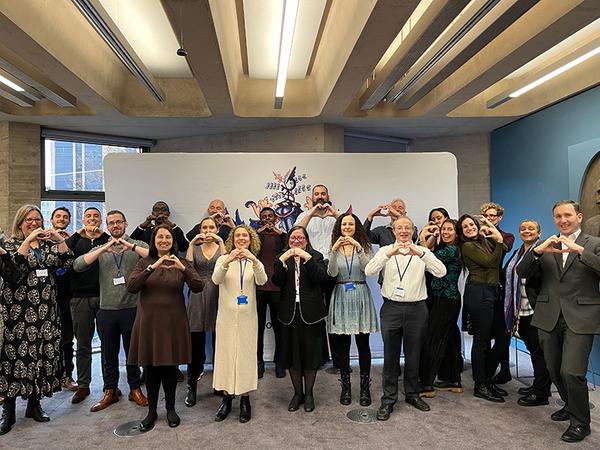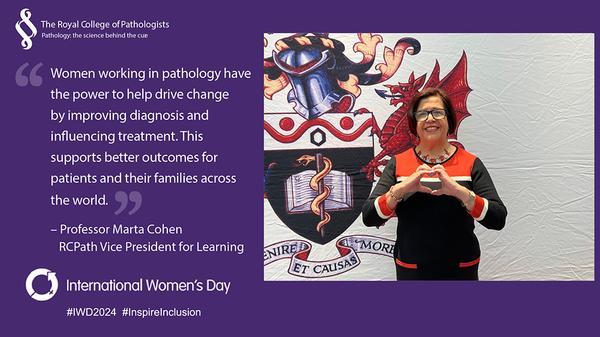International Women's Day (IWD) is a global event celebrated annually. The aim behind IWD is to focus on women's achievements and raise awareness about discrimination that women still face, to encourage action that will help drive gender parity. This year's campaign, #InspireInclusion, aims to inspire people to value and take steps towards women's inclusion across all levels of society.
Present times
Women are pursuing and forging careers in pathology in increasing numbers. This shift is partly due to more women entering the medical profession. Overall, female pathologists currently make up between one-third to half of the pathology workforce worldwide. They also make significant contributions to research and academia within the field.
Achieving a work-life balance is not always easy, especially for parents with young families. However, efforts to accommodate family responsibilities and promote flexible work arrangements have been rising.
In addition, although current data reveals that disparities persist when it comes to professorial rank and positions of leadership, there has been progress. The Royal College of Pathologists appointed its first female leader, President Professor Dame Barbra Clayton, in 1984. This was followed by Dr Suzy Lishman CBE (2014 – 2017) and Professor Jo Martin (2017 – 2020).
The foundations laid by pioneer female pathologists in the late nineteenth to early twentieth century helped develop modern medicine and paved the way for women working in healthcare in 2024. However, despite huge advancements made regarding gender equality in pathology, there is still potential for more progress to be made.

Remembering pioneering women in pathology
Myrtelle May Canavan (1879 - 1953), Dorothy Stuart Russell (1895 - 1983), Sophie Spitz (1910 - 1956), Priscilla Dienes Taft (1917 - 2002) and Maria Magdalena Dabska (1921 - 2014) are amongst the earliest female pathologists.
The task of entering a male-dominated field, as in any medical specialty at the time, was not easy:
- Canavan was appointed curator of the Warren Anatomical Museum at Harvard Medical School in 1920. However, despite her contributions to the medical school, her official title remained `assistant curator' throughout her working life due to objections to a woman heading the museum, and she was never appointed to Harvard faculty.
- In 1919, Dorothy Russell started her medical career at the London Hospital Medical College, which had just opened registration to women. Female students, however, endured discrimination and were often treated as second-class citizens.
- Two decades later, before the start of WWII, Harvard Medical School denied Priscilla Dienes Taft admission because of her gender. Luckily, she was accepted by Yale Medical School where she was a successful student, graduating in 1944. Taft later became the director of the cytology laboratory, but not before winning her case for equal pay (she was working full-time and only receiving a part-time salary).
What did these pioneering women have in common?
Firm determination, defiant spirits, and inquisitive minds were key players in their success, leading them to leave a legacy that includes the first description of conditions that still today carry their names, such as `Canavan disease’, `Spitz naevus’, or `Dabska tumour’.
Dorothy Russell was renowned for her contributions to the” Classification of Bright's Disease,” the “Pathology of Hydrocephalus,” and the “Pathology of Tumors of the Nervous System.”

"Women working in pathology have the power to help drive change by improving diagnosis and influencing treatment. This supports better outcomes for patients and their families across the world." — Professor Marta Cohen, RCPath Vice President for Learning.
The way forward
Progress on gender inequality, inclusion and equity has gathered momentum over the last sixty years. Many countries are witness of these achievements but there is still the need for progress. A multi-faceted approach aimed at addressing systemic barriers and promoting inclusivity will further contribute to advancement, such as:
- providing educational resources and outreach campaigns to encourage young women to pursue careers in pathology
- engaging male colleagues as allies in promoting gender equality can help create a more inclusive and supportive environment for all pathologists
- providing training to raise awareness of unconscious biases can help combat gender stereotypes and promote fair treatment and recognition of all pathologists.

